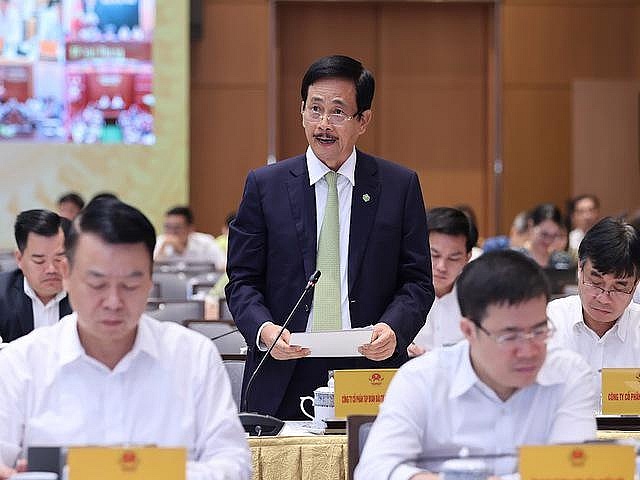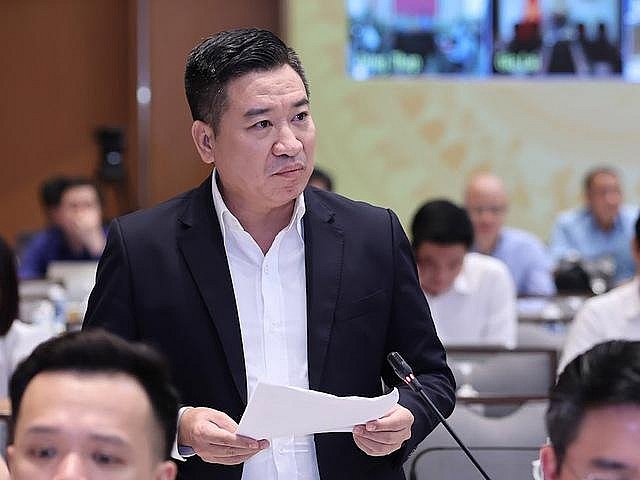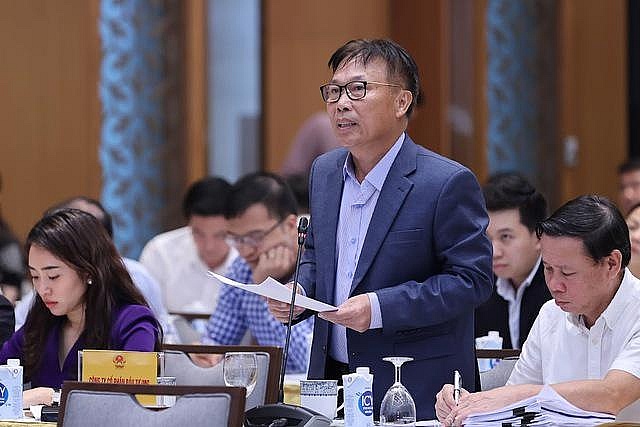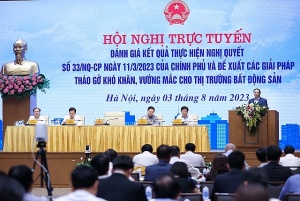Solutions proposed to solve real estate market issues
 |
| Bui Thanh Nhon, chairman of Novaland Group |
During an online conference on August 4 to evaluate the implementation of Resolution No.33/NQ-CP and propose solutions to aid the recovery of the real estate market, Bui Thanh Nhon, chairman of Novaland Group said, "Resolution 33 is valuable oxygen for the business community right now so it does not fall into deeper trouble."
The Novaland chairman proposed that the government should remove the legal obstacles for all projects across the country as soon as possible.
"The government should strengthen the legal framework to protect the property rights of private enterprises and the interests of entrepreneurs," Nhon added.
 |
| Nguyen Dinh Trung, chairman of Hung Thinh Group |
Nguyen Dinh Trung, chairman of Hung Thinh Group, was of the same opinion as he spoke admiringly of Resolution 33's outcomes.
"A project that reaches the stage of receiving a construction permit can create jobs and generate orders for hundreds of related industries. However, at present, it is too hard to get approval for the permit. We hope that all government agencies will find solutions to support enterprises in this process," Trung said.
Investors can only access bank loans when they have completed land and project construction procedures. Due to the difficult legal situation, this becomes problematic.
The company recommend that banks should adjust lending conditions flexibly for each phase of a project. This would help businesses, banks, and consumers to circulate cash flows, create jobs, and increase people's spending.
To reach the goal of creating one million social houses by 2030 (a goal that Hung Thinh Group has registered to assist with), the company suggested allowing buyers to freely transfer houses. In this case, the transferee must be required to pay an additional amount corresponding to the value of the land use levy.
Real estate projects are currently calculating land use fees through the residual method, which is the best option for now. In this situation, the application of the consumer price index (CPI) in calculating land use fees is reasonable. However, Trung said it is necessary to apply the local CPI to accurately reflect the growth and economic status of the locality.
"Finally, we recommend that the Ministry of Natural Resources and Environment, the Ministry of Finance, and the Ministry of Construction consider using the land price adjustment coefficient method. In this way, we can calculate the land use fee to pay before deciding to invest and cooperate," said Trung.
 |
| Le Tu Minh, chairman of IMG Investment JSC |
Le Tu Minh, chairman of IMG Investment JSC, emphasised three methods to remove the obstacles in the real estate market.
The first is to fight against land speculation. Currently, this issue, and other manipulation of the real estate market, is affecting the Vietnamese economy. Buyers wait for the opportunity of increasing prices, which wastes resources that could be poured into production.
"The experience of other countries is to use taxes to regulate speculation. We have a project in Australia where every year we have to pay a 2 per cent land tax (about $700,000-800,000) even when the project has not yet been implemented. This year, the local government increased this tax rate to 4 per cent.
If Vietnam applies this policy, only businesses that can actually develop the real estate project will keep the land, and they will carry out the construction more quickly," Minh said.
Secondly, with medium-term interest rates higher than 10 per cent, no economy can develop well. Developed countries often apply medium-term interest rates of 3-5 per cent. In Vietnam, these are quite high, standing at 12-14 per cent a half year ago. Businesses find it much harder to borrow and customers lose confidence in the real estate market, so they pour money into other channels.
"We should lower the medium-term interest rate to around 8.5 per cent like two years ago," he suggested.
Finally, the biggest difficulty in real estate businesses is the legal framework, which is too overlapping. For many problems and regulations, there are different interpretations, so the enforcement is not consistent and businesses become desperate.
"In our companies, we assign work and deadlines. If staff miss the deadline without an acceptable reason, they will be fined or removed from the project. However, nothing is done if state officials work too slowly or fail in their duties. The losses due to delays like this are much more harmful than those due to embezzlement," Minh urged.
"Therefore, we recommend quickly perfecting the legal framework to ensure officials work quickly and effectively. There should be clear regulations on decentralisation and the responsibilities at all levels. Roles should be clearly stipulated to provide accountability for any delays," he suggested.
 | Proper land valuation vital to removing property bottlenecks Experts shed light on the importance of suitabl land valuation to facilitate the recovery of the real estate market at a VIR's seminar "Proper land valuation to remove project bottlenecks" held in Hanoi yesterday. |
 | Real estate developers voice issue with new loan conditions Contents in a new circular to take effect in September have raised concerns from real estate developers over potential added difficulties for businesses to access loans. |
 | PM highlights responsibilities of all stakeholders in real estate market Prime Minister Pham Minh Chinh has emphasised that relevant stakeholders need to cooperate to remove the obstacles and allow the real estate market to develop safely and sustainably. |
What the stars mean:
★ Poor ★ ★ Promising ★★★ Good ★★★★ Very good ★★★★★ Exceptional
Related Contents
Latest News
More News
- Saigon Centre gains LEED platinum and gold certifications (February 12, 2026 | 16:37)
- Construction firms poised for growth on public investment and capital market support (February 11, 2026 | 11:38)
- Mitsubishi acquires Thuan An 1 residential development from PDR (February 09, 2026 | 08:00)
- Frasers Property and GELEX Infrastructure propose new joint venture (February 07, 2026 | 15:00)
- Sun Group led consortium selected as investor for new urban area (February 06, 2026 | 15:20)
- Vietnam breaks into Top 10 countries and regions for LEED outside the US (February 05, 2026 | 17:56)
- Fairmont opens first Vietnam property in Hanoi (February 04, 2026 | 16:09)
- Real estate investment trusts pivotal for long-term success (February 02, 2026 | 11:09)
- Dong Nai experiences shifting expectations and new industrial cycle (January 28, 2026 | 09:00)
- An Phat 5 Industrial Park targets ESG-driven investors in Hai Phong (January 26, 2026 | 08:30)

 Tag:
Tag:


























 Mobile Version
Mobile Version